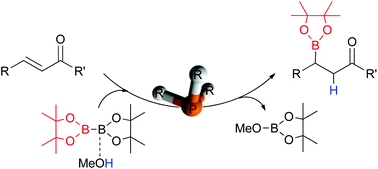Essential role of phosphines in organocatalytic β-boration reaction†
Abstract
The use of

* Corresponding authors
a
Dpt. Química Física i Iorgànica, Universitat Rovira i Virgili, C/Marcel.lí Domingo s/n, 43007 Tarragona, Spain
E-mail:
mariaelena.fernandez@urv.cat
Web: http://www.quimica.urv.net/tecat/catalytic_organoborane_chemistry.php
Fax: +34 977559563
b Institute of Chemical Research of Catalonia (ICIQ), Avda. Països Catalans, 17, 43007 Tarragona, Spain
The use of

 Please wait while we load your content...
Something went wrong. Try again?
Please wait while we load your content...
Something went wrong. Try again?
C. Pubill-Ulldemolins, A. Bonet, H. Gulyás, C. Bo and E. Fernández, Org. Biomol. Chem., 2012, 10, 9677 DOI: 10.1039/C2OB26899J
To request permission to reproduce material from this article, please go to the Copyright Clearance Center request page.
If you are an author contributing to an RSC publication, you do not need to request permission provided correct acknowledgement is given.
If you are the author of this article, you do not need to request permission to reproduce figures and diagrams provided correct acknowledgement is given. If you want to reproduce the whole article in a third-party publication (excluding your thesis/dissertation for which permission is not required) please go to the Copyright Clearance Center request page.
Read more about how to correctly acknowledge RSC content.
 Fetching data from CrossRef.
Fetching data from CrossRef.
This may take some time to load.
Loading related content
